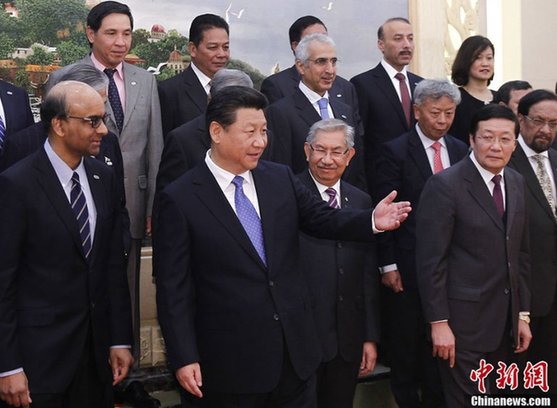The AIIB boosts Asian confidence in connectivity
- By Zhou Shixin
 0 Comment(s)
0 Comment(s) Print
Print E-mail China.org.cn, November 1, 2014
E-mail China.org.cn, November 1, 2014
Twenty-one Asian countries signed the Memorandum of Understanding on Establishing Asian Infrastructure Investment Bank to become the bank's founding members on Oct. 24, 2014 in Beijing. It's a great event for the stakeholders to prioritize infrastructure by building such a multilateral investment bank. Undoubtedly, more countries will join the AIIB initiative in the future to lay solid foundations for their economic growth and social welfare, because the bank is open and inclusive not only to countries in Asia, but also to countries all over the world.
|
|
|
Chinese President Xi Jinping (C, front) meets with representatives of 21 Asian countries who signed the Memorandum of Understanding on Establishing Asian Infrastructure Investment Bank (AIIB) in Beijing, capital of China, Oct. 24, 2014. [Source: chinanews.com] |
Chinese President Xi Jinping initially proposed the formation of the AIIB when holding a talk with former Indonesian President Susilo Bambang Yudhoyono in Jakarta on Oct. 2, 2013. He said that China would prepare for the construction of the AIIB to provide financial support for infrastructure construction in developing countries throughout the region, including ASEAN countries. Just as China's Foreign Ministry Spokesperson Hua Chunying said, the purpose of setting up the AIIB is to boost Asian economic development, wealth creation and infrastructure connectivity through investment in infrastructure and industry.
Of course, China's proposal to build the AIIB has been interpreted in a variety of ways and has elicited divergent reactions from the international community. There are generally three kinds of attitudes. The first type of attitude is positive and characterized by a willingness to participate in the initiative. During a visit to China in May 2014, Malaysian Prime Minister Najib Razak said that Malaysia would actively participate in building the Maritime Silk Road of the 21st Century and in planning the construction of the AIIB in order to promote mutual development.
The second kind of attitude is skeptical, suspicious, or even hostile. The Deputy Prime Minister and Finance Minister of Japan Taro Aso said that Japan hadn't been approached by China, and Japan broadly supports a proposal by G20 chair Australia to set up a new center to promote infrastructure investment.
The third kind of attitude is quite neutral, and those countries and individuals with this attitude wait to see more benefits. In April 2014, a Thai official said that Thailand could not participate in the negotiations because of domestic political turmoil, but now the new government of Thailand holds a positive attitude toward the AIIB initiative and has joined in construction efforts. On May 3, 2014, Indian Finance Minister P. Chidambaram said in an interview that China hadn't invited India to participate in the discussion of the AIIB, but after Xi Jinping's visit to India, India began taking part in the initiative and is now one of the AIIB's founding members.
Some countries are reluctant to join in the initiative not because of interests, but because they have been coerced by the United States, which is on edge about the AIIB. During U.S. President Barack Obama's visit to Japan in April 2014, the two countries issued a joint statement, "The United States and Japan: Shaping the Future of the Asia-Pacific and Beyond," in which the two countries said they "support the Asian Development Bank's work to address the region's infrastructure and connectivity needs." The United States is quite afraid that the AIIB will challenge the Bretton Woods System that it has always dominated. It is said that the Republic of Korea and Australia relinquished the chance to become founding members under strong pressure from the U.S. However, two other allies of the U.S. - the Philippines and Thailand - joined the initiative for their own interests against U.S. wishes.







Go to Forum >>0 Comment(s)